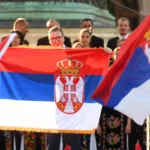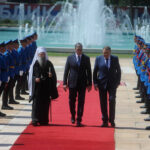- Russia restructures Serbia’s debts
Vladimir Putin has signed into law the ratification of four protocols creating the legal basis for restructuring Serbia’s debts to Russia based on a series of intergovernmental agreements.
Serbia’s debt for export loans amounted to $102.231 million and EUR 1.944 million, for financial loans – $38.33 million, and for Yugoslavia’s obligations – another $2.96 million.
Under the restructuring terms, interest on the loans will no longer be accrued, and payments made by the Serbian side shall cover that of the principal debt.
The Russian media explain that these agreements are required due to significant difficulties that have arisen in the payment of debt in dollars and euros in the wake of Western sanctions. New mechanisms, according to Russian sources, will allow Moscow to avoid the blocking of funds by third countries.
At the same time, observers in the region believe the move reflects Moscow’s “gratitude” to Belgrade for refusing to align with the EU’s sanctions against Russia.
- Russian diplomatic mission’s branch launches work in Banja-Luka.
The President of Republika Srpska, Milorad Dodik, and Russian Ambassador to Bosnia and Herzegovina Igor Kalabukhov took part in the relevant ceremony.
Russian Foreign Minister Sergey Lavrov emphasized in a video address that relations between Russia and Republika Srpska are seeing a great upswing. “Contacts at the highest level have become regular, an intensive and trusting political dialogue is underway,” Lavrov said.
With the opening of the office of the Russian Embassy in Banja Luka, Bosnia and Herzegovina became the only country in the Western Balkans where Russia managed to expand its diplomatic representation after launching aggression against Ukraine in 2022.
Commenting on this and a number of other similar developments, the Institute for the Study of War (ISW) noted that the Kremlin and its allies continue to seek to use Russia’s relationship with Republika Srpska to destabilize the Balkans.
- International exercise ongoing in Serbia with U.S. participation
From June 10 through June 21, the international tactical exercise Platinum Wolf 24 organized by the Armed Forces of Serbia and the European Command of the US Armed Forces (EUCOM) is taking place in Serbia.
The purpose of the drill, as reported by the Ministry of Defense of Serbia, is to improve interoperability and mutual understanding of the armed forces of partner countries during peacekeeping operations in a multinational environment.
More than 200 participants in the exercise will practice tactics, techniques, and procedures applied during peacekeeping operations, with an emphasis on the use of non-lethal capabilities. Combat operations in urban settings, defense of a strong point, crowd suppression and roadblock operations are all part of the training effort.
The Platinum Wolf exercise is being held for the second time since 2023, despite a moratorium on military drills involving foreign partners, introduced by Belgrade in February 2022.
This confirms the intention of Serbian authorities to maintain working relations with the West, even in such a sensitive area as the military.
- All countries of Western Balkans take part in Summit on Peace in Ukraine
At the Global Peace Summit, which took place in Switzerland on June 15-16, the Balkans and Southeast / Central Europe were represented by high-ranking officials at various levels – from presidents to foreign ministers.
Albania was represented by President Bajram Begaj.
Bosnia and Herzegovina – by head of the Presidium (Presidency) Denis Becirovic.
Kosovo – by President Vjosa Osmani
North Macedonia – by President Gordana Siljanovska-Davkova
Serbia – by Minister of Foreign Affairs Marko Djuric
Montenegro – by President Jakov Milatovic.
All Western Balkan nations supported the final communique of the Summit.
The biggest surprise was the participation of the Serbian delegation.
Serbian and Russian media “justify” Belgrade’s participation in the event and support for the communique by claiming that the document emphasized compliance with the UN Charter and international law, which is seen as important given the situation of Kosovo.
- Albania, Kosovo, lift border control for so-called “small border traffic”
On June 13, the agreement entered into force on a free movement between the two states for residents of the 30-kilometer border zone at special checkpoints.
The intergovernmental agreement on free movement on the border between Albania and Kosovo was signed on November 26, 2021.
Critics of the opening of borders between Kosovo and Albania point out that it is part of an ongoing effort to create a “Greater Albania”.
At the same time, officials in Tirana and Pristina state that the free movement of goods and individuals is an element of the so-called Berlin process within the European integration of the region.



